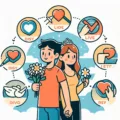Empathy is the backbone of any strong relationship. It’s the ability to understand and share the feelings of another person. In romantic partnerships, empathy can be the difference between enduring love and a fleeting fling. This article will explore practical steps on how to foster empathy in your relationship and ensure a deeper, more meaningful connection with your partner.
Understand the Concept of Empathy
Before you can be empathetic, you must understand what it truly means. Empathy involves more than just listening to your partner; it encompasses a genuine desire to comprehend their emotions and perspectives without judgment. This means putting yourself in their shoes and seeing the world through their eyes.
Active Listening Is Key
Active listening is a vital component of empathy. It’s about giving your full attention to your partner when they are sharing their thoughts and feelings. This requires patience, openness, and the willingness to engage without immediately offering solutions or advice.
Express Understanding
Once you’ve listened, it’s important to communicate that you understand what your partner is feeling. This can be done through verbal affirmations or physical gestures that show you are present and connected with their emotional state.
Ask Insightful Questions
Asking questions that delve deeper into your partner’s experiences can demonstrate your commitment to understanding them. It shows that you’re not just hearing their words but also trying to grasp the emotions and motivations behind them.
Practice Empathy Daily
Empathy is like a muscle that needs regular exercise. Make it a daily practice to engage empathetically with your partner, and over time, it will become a natural part of how you interact.
FAQs about Empathy in Relationships
- Why is empathy important in a relationship?
Empathy fosters a deeper emotional connection, builds trust, and promotes a supportive environment where both partners feel understood and valued. - How can I improve my empathy skills?
Improving empathy involves active listening, being present, exercising patience, and regularly putting in the effort to understand your partner’s perspective. - Can empathy be learned?
Yes, empathy can be learned and developed over time with practice and a genuine desire to connect with others on an emotional level. - What if I’m finding it hard to empathize with my partner?
If you’re struggling to empathize, it might be helpful to seek guidance from a therapist or counselor who can provide strategies and exercises to enhance your empathetic abilities. - How does empathy contribute to resolving conflicts?
Empathy allows partners to see each other’s points of view, reducing misunderstandings and facilitating a more amicable resolution to conflicts.









